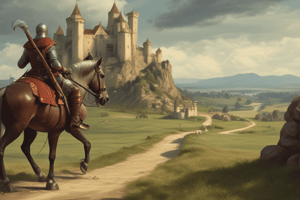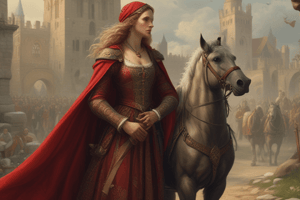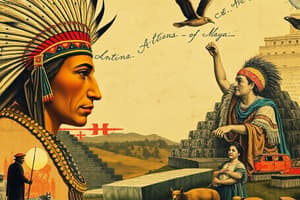Podcast
Questions and Answers
Which Native American group was known for their maize cultivation and cliff dwellings in present-day Utah and Colorado?
Which Native American group was known for their maize cultivation and cliff dwellings in present-day Utah and Colorado?
- Cahokia civilization
- Ute people (correct)
- Iroquois people
- Chumash people
Which region had nomadic hunter-gatherer groups like the Ute people?
Which region had nomadic hunter-gatherer groups like the Ute people?
- Northeastern groups
- Coastal regions
- Great Plains (correct)
- Mississippi River Valley
Which European country sponsored Christopher Columbus's voyage west in 1492?
Which European country sponsored Christopher Columbus's voyage west in 1492?
- Portugal
- England
- Spain (correct)
- France
What major event signaled the beginning of European arrival in the Americas?
What major event signaled the beginning of European arrival in the Americas?
What was the main reason for Europeans arriving in the Americas, seeking sea-based trade routes to Asia?
What was the main reason for Europeans arriving in the Americas, seeking sea-based trade routes to Asia?
Which Native American group lived communally in longhouses and were farmers?
Which Native American group lived communally in longhouses and were farmers?
Which food items were transferred from the Americas to Europe?
Which food items were transferred from the Americas to Europe?
What animals were introduced to the Americas by Europeans?
What animals were introduced to the Americas by Europeans?
What impact did the exchange of gold, silver, and enslaved Africans between the Americas and Europe have?
What impact did the exchange of gold, silver, and enslaved Africans between the Americas and Europe have?
What disease brought by Europeans decimated native populations in the Americas?
What disease brought by Europeans decimated native populations in the Americas?
Which country's colonization efforts in the Americas focused on agriculture and precious metal extraction?
Which country's colonization efforts in the Americas focused on agriculture and precious metal extraction?
What social hierarchy system was introduced by Spain in the Americas?
What social hierarchy system was introduced by Spain in the Americas?
Study Notes
- The video is a part of the AP US History Ultimate Review Pack to help students get an A in class and a 5 on the exam.
- Unit 1 of the AP US History curriculum focuses on understanding the societal makeup of the Americas before and after the arrival of Europeans.
- Native American societies were diverse, with different lifestyles like farming, hunting, fishing, and building cities.
- Pueblo people in present-day Utah and Colorado were farmers known for their maize cultivation and cliff dwellings.
- Great Basin and Great Plains regions had nomadic hunter-gatherer groups like the Ute people.
- Coastal regions had settled populations like the Chumash in California and Chinook in the Pacific Northwest.
- Northeastern groups like the Iroquois were farmers living communally in longhouses.
- Mississippi River Valley housed farming communities like the Cahokia civilization with a centralized government.
- Europeans arrived seeking sea-based trade routes to Asia due to Muslim control over land routes, leading to Portugal's trading post empire and Spain's maritime advancements.
- Christopher Columbus, sponsored by Spain, sailed west in 1492 to find new wealth, signaling the beginning of European arrival in the Americas.- Columbus's landing in the Caribbean led to the Columbian Exchange, which involved the transfer of people, animals, plants, and diseases between the Eastern and Western Hemispheres.
- Food items like potatoes, tomatoes, and maize were transferred from the Americas to Europe, while wheat, rice, and soybeans were sent from Europe to the Americas.
- Animals such as turkeys were sent from the Americas to Europe, while cattle, pigs, and horses were introduced to the Americas by Europeans.
- The exchange of gold, silver, and enslaved Africans between the Americas and Europe had profound economic and societal impacts, leading to a shift from feudalism to capitalism in European states.
- Smallpox brought by Europeans decimated native populations in the Americas, while Europeans also contracted diseases like syphilis during their travels.
- Spain's colonization efforts in the Americas focused on agriculture and the extraction of precious metals, leading to the introduction of the encomienda system where natives were forced to work on plantations.
- The introduction of African slave laborers in the Americas was a solution to issues faced by the Spaniards, including native resistance and the impact of diseases like smallpox.
- The casta system was introduced by Spain in the Americas, categorizing people based on their racial ancestry, with natives and Africans at the bottom of the social hierarchy.
- Europeans viewed native Americans as inferior and exploited them for labor, military alliances, and Christian conversion, justifying their actions through elaborate belief systems.
- European colonization also led to the exploitation of African laborers, with justifications drawn from distorted interpretations of biblical narratives.
Studying That Suits You
Use AI to generate personalized quizzes and flashcards to suit your learning preferences.
Description
Test your knowledge on European colonization of the Americas, including the Columbian Exchange, impact on native populations, African slave labor, and the encomienda system. Explore the diverse Native American societies before and after European arrival, from farming communities to nomadic hunter-gatherer groups.




